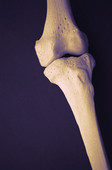In addition, doctors should consider drug treatment to prevent fractures in patients at risk of developing osteoporosis.
The guideline authors didn't find evidence that one drug is definitively better than another and recommended that doctors make individual treatment decisions based on the risks, benefits, and a side effects profile of available drugs.
However, the authors noted that bisphosphonates are reasonable options for beginning treatment, because these drugs reduce the risk of vertebral, non-vertebral and hip fractures.
"Because treatment options may affect various parts of skeletal system differently, we analyzed the available evidence on numerous drugs to prevent fractures in men and women," guideline co-author Dr. Vincenza Snow, director of clinical programs and quality of care at ACP, said in a news release.
"Bisphosphonates can be considered a first-line therapy, particularly for patients at risk for hip fracture. However, there is no clear evidence showing the appropriate duration of treatment with these drugs," Snow said.
Upset stomach is a common side effect of bisphosphonates, and breakdown of the jaw bone is a rare and more serious risk associated with the drugs.
Among other treatment options, estrogen reduces the risk of vertebral, non-vertebral and hip fractures but may increase the risk of certain cancers, stroke and blood clots, the guideline authors said. Drugs that work on estrogen receptors decrease spine fractures, but not hip fractures, and have no serious side effects.
There's fair-to-good evidence that calcitonin and teriparatide reduce spine fractures, but calcitonin doesn't decrease the risk of other types of fractures. Neither drug has serious side effects.
"The evidence on use of calcium, with or without vitamin D, is mixed, and the effectiveness is modest," Snow said.
The new guideline is published in the Sept. 16 issue of Annals of Internal Medicine.
More information
The U.S. National Institute of Arthritis and Musculoskeletal and Skin Diseases has more about medications to prevent and treat osteoporosis.
Attribution: -- Robert PreidtSOURCE: American College of Physicians, news release, Sept. 15, 2008
Copyright © 2008 ScoutNews, LLC
 . All rights reserved.
. All rights reserved.HealthDayNews articles are derived from various sources and do not reflect federal policy.
omhrc.gov does not endorse opinions, products, or services that may appear in news stories.


